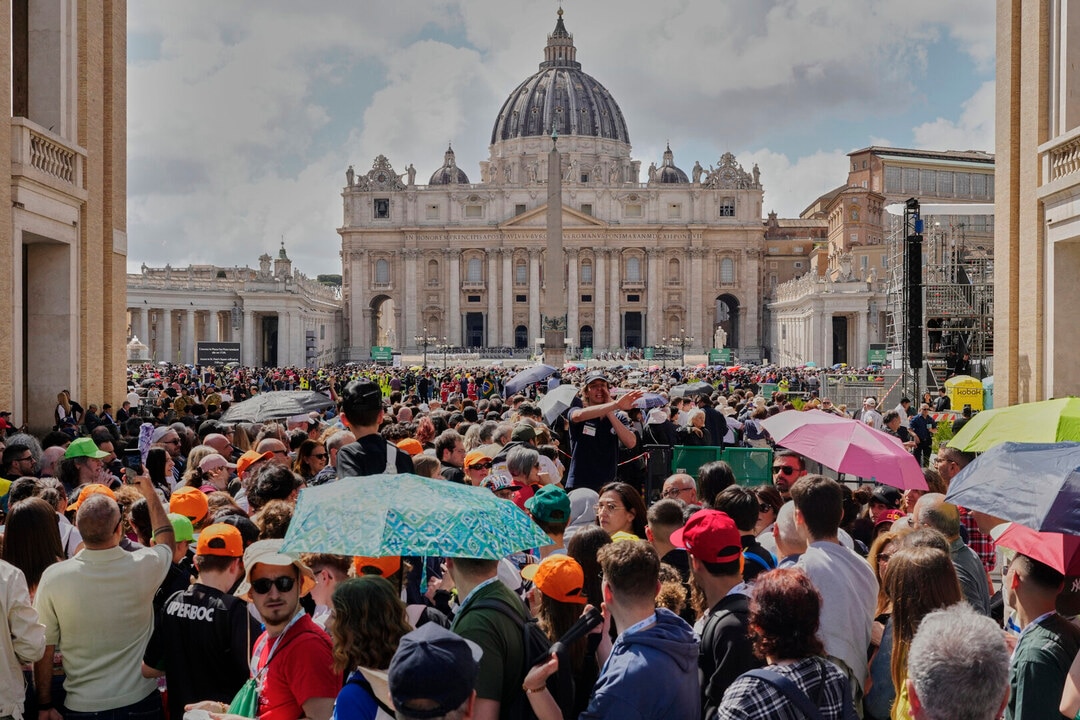‘What do I do?’ Mykola Bychok’s dilemma after Pope Francis died
Australia’s Cardinal Mykola Bychok was 20 minutes into a flight from Melbourne to Jerusalem on Easter Monday when he found out, to his shock, that Pope Francis had died.

Australia’s Cardinal Mykola Bychok was 20 minutes into a flight from Melbourne to Jerusalem on Easter Monday when he found out, to his shock, that Pope Francis had died.
The Ukrainian-born Melbourne bishop who was only appointed Cardinal last December, had just settled into the flight to the Holy Land and turned on the news when he saw a strap line running across the bottom of CNN.

“The line said ‘Pope Francis has died,” Cardinal Bychok told The Australian. He said he hardly believed the news, saying to himself: “What?! Just yesterday he had blessed the people, made a short speech’. Then on the screen it came up ‘Breaking News’ …”
The Cardinal, who was on his way to a spiritual retreat of bishops in Israel, said he was left in a quandary. “It was a challenge for me,” he said. “What should I do? Do I fly on to the Holy Land or do I return?”
In the end, he decided to see his visit to Israel out, flying on to Rome on Thursday with the Patriarch of Jerusalem, Cardinal Pierbattista Pizzaballa – one of the candidates for the papacy.
He said, smiling, that he’d packed enough clothes to see him through the conclave, which starts 15 days after the Pope’s death. “I was ready for the conference of Catholic bishops in Sydney (after the Israel trip). I was ready for two to three weeks.”

Cardinal Bychok said he had come to Rome with “sorrow, but not without hope’’ preparing to entrust the soul of Pope Francis to the boundless mercy of God.
“This is a profoundly sacred moment for the Church and for the world,’’ he said.
“If there was ever a Pope who proclaimed, lived, and embodied God’s mercy, it was Francis. He was a Pope of mercy — not just in word, but in action. He reached out to the poor, the excluded, the wounded. He taught us not to judge but to accompany. He reminded us again and again that no one is beyond the reach of God’s love.”
The cardinal, who heads the Saints Peter and Paul Catholic Church in North Melbourne and aged just 45 is the youngest of the 135 cardinals who will pick the new pope, said he was still coming to terms with his elevated position within the Catholic Church.
He said when the Pope announced last October he was to be created a cardinal, he sent an immediate message to the Archbishop of Perth Timothy Costelloe saying “ I am in deep shock, pray for me’’.
But the young cardinal and the Pope had formed an immediate connection through his homeland, Ukraine.
“He was an altar boy to a Ukrainian priest in Argentina, so he’s very close to the heart of Ukraine,” he said.
He added that when he was made a cardinal in the ceremony called a Consistory last December he used the occasion to ask the Pope about 20,000 Ukrainian children forcibly removed to Russia.
He said: “It was a great opportunity to ask him from my side to free those children who are forcibly removed, approximately 20,000 children from occupied areas to Russia. Then he said to me, ‘I can’t speak English, you can’t speak Italian but between us the holy spirit is doing great things”.
He said that Pope Francis’ closeness to Ukraine was especially moving.
“In our darkest hours, he did not forget us. He spoke often of our suffering. He prayed for peace. He wept with us. He appealed to the world not to grow indifferent. While some may have wished for stronger political gestures, what the Pope offered was something uniquely Christian: a pastoral closeness, a fatherly concern, and an unceasing call for peace — not revenge, not escalation, but peace rooted in justice and reconciliation.”
Cardinal Bychok added: “He was a bridge builder. A man who never stopped hoping that peace, even in the most hopeless of situations, is possible with God.’’
The Cardinal described the war between Russia and Ukraine as a “David and Goliath” battle.
“It’s very simple, who is the aggressor, who came to Ukraine?”
“You should remember at the beginning of the war, 99 diplomats, ambassadors left Ukraine because they believed Russia, that after three days it would be completely Russian territory, but we are more than three years (on) because we are not alone. “We are with God, we are praying and you know the story about David and Goliath”.
He added: “it’s a really terrible time” since President Trump won the US election.






To join the conversation, please log in. Don't have an account? Register
Join the conversation, you are commenting as Logout